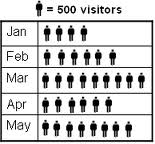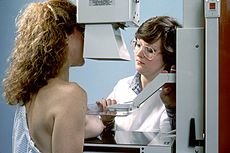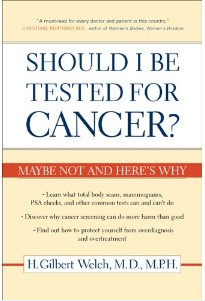 Andrews was easily the most anxious patient I took care of that month, a gray Michigan February (is there any other kind?) which I spent in the hospital caring for patients admitted to the general medical ward at the Ann Arbor Veterans Affairs Medical Center. (Andrews is a pseudonym, as are all the patients I blog about, unless otherwise indicated.) He had plenty to be anxious about, too. His leukemia was raging out of control, his blood looking like pus, teeming as it was with malignant white blood cells. At his age—he was almost 60—and after a decade of chronic bone marrow cancer, his disease was especially dangerous. Odds were high he would survive for less than a year.
Andrews was easily the most anxious patient I took care of that month, a gray Michigan February (is there any other kind?) which I spent in the hospital caring for patients admitted to the general medical ward at the Ann Arbor Veterans Affairs Medical Center. (Andrews is a pseudonym, as are all the patients I blog about, unless otherwise indicated.) He had plenty to be anxious about, too. His leukemia was raging out of control, his blood looking like pus, teeming as it was with malignant white blood cells. At his age—he was almost 60—and after a decade of chronic bone marrow cancer, his disease was especially dangerous. Odds were high he would survive for less than a year.
Unless . . . ! Unless the genetics of his cancer were favorable, indicating a good likelihood that he would respond to chemotherapy. So Andrews and I (and the rest of my general medicine team) waited to hear back from the oncologists about the result of his genetic studies.
Andrews wasn’t afraid of dying, because he’d already had a first-hand view of death at its worst. Twenty years earlier, he was working as a card dealer in Vegas and had fallen in love with another dealer. In the open-minded culture of that city… (Read more and view comments at Forbes)
Breast Cancer Hotline Reveals Widespread Communication Problem with Doctors
I got an email recently from someone who read Critical Decisions, and who said it resonated with her in part because of work she does with a breast cancer hot line.
“I’ve been volunteering as a Helpline worker for Living Beyond Breast Cancer. We get a lot of calls from women who seem to have communication problems with their doctors. Sometimes they don’t understand aspects of their treatment or are puzzled by unexpected side effects or think they’ll be seen as complainers if they speak up. We always tell them it’s part of their doctors’ jobs to answer questions and explain stuff, and we try to give them some information about what they’re experiencing to help them formulate questions. But your book also made me think it would be a good idea to help them articulate their values and priorities.”
My advice: Write down your questions in advance. And bring someone along to the visit, if possible, who is not shy about asserting themselves in front of doctors.
Any other suggestions you would have her pass along to the women calling in?
Deciding About Breast Cancer Chemotherapy
 As if being diagnosed with breast cancer wasn’t bad enough, many women with this diagnosis face complicated decisions about what kind of medicine or chemotherapy to take, if any, to reduce their chance of cancer recurrence. As I discussed in a recent post, the mathematics of such decisions can be hard to comprehend for many patients. But given that the right choice often depends on patient preferences, it would be great to help patients understand enough of their math to involve them in making the choice.
As if being diagnosed with breast cancer wasn’t bad enough, many women with this diagnosis face complicated decisions about what kind of medicine or chemotherapy to take, if any, to reduce their chance of cancer recurrence. As I discussed in a recent post, the mathematics of such decisions can be hard to comprehend for many patients. But given that the right choice often depends on patient preferences, it would be great to help patients understand enough of their math to involve them in making the choice.
A group of researchers has developed a tool to help women with these decisions. Called Adjuvant Online, it is a computer algorithm that takes in information about a specific woman’s cancer, and then produces survival estimates for her, illustrating her chance of survival and breast cancer recurrence based upon whether she chooses one set of treatments versus another… (Read more and view comments at Forbes)
Beware Overreaching Government Efforts to Detect Breast Cancer
 JoAnn Pushkin’s breast cancer was diagnosed at an advanced stage because the density of her breasts obscured the tumor on her mammograms. That was shocking news to Pushkin, who only learned that her breasts were radiologically dense at the time of her diagnosis. Activated by this revelation, she has become a leading advocate of legislation, like that recently passed in the state of New York…(Read more and view comments at Forbes)
JoAnn Pushkin’s breast cancer was diagnosed at an advanced stage because the density of her breasts obscured the tumor on her mammograms. That was shocking news to Pushkin, who only learned that her breasts were radiologically dense at the time of her diagnosis. Activated by this revelation, she has become a leading advocate of legislation, like that recently passed in the state of New York…(Read more and view comments at Forbes)
Are Physicians Smarter than Fifth Graders?
All too often the most powerful illusions seduce us through truthful whisperings. Let’s start with an obvious truth: Living a long and happy life after a cancer diagnosis is better than living a short miserable one…(Read the rest and view comments at Critical Decisions)
The Upside of Metastatic Prostate Cancer
 The American Urological Association (the AUA) is outraged that the Unites State Preventative Services Task Force doesn’t support, has even “disparaged,” PSA screening. Dr. John Lynch, a member of its Board of Directors, even appealed to prostate cancer survivors to lobby against the Task Force’s recommendation, painting a dire picture of life without this controversial screening test…(Read the rest and view comments at Critical Decisions)
The American Urological Association (the AUA) is outraged that the Unites State Preventative Services Task Force doesn’t support, has even “disparaged,” PSA screening. Dr. John Lynch, a member of its Board of Directors, even appealed to prostate cancer survivors to lobby against the Task Force’s recommendation, painting a dire picture of life without this controversial screening test…(Read the rest and view comments at Critical Decisions)
